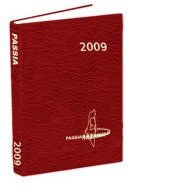PASSIA Diary 2009
Every year since 1988, PASSIA has published its “Diary”, which continues to follow its original aims and goals, i.e., to provide a comprehensive directory of contact in formation for relevant organizations operating in the West Bank and Gaza – listing names, addresses, main activities – combined
with a full day-to-day planner (calendar) of the respective year and a comprehensive compilation
of events and statistics related to Palestine and the Palestinians.
The PASSIA Desk Diary is annually updated – entries are added, changed or re moved and new addresses and information are included. PASSIA is proud to say that its diary has become an invaluable source of in formation for many people, both locally and abroad, and as yet there is no equivalent publication in Palestine.
Overview
The 2009 edition contained 456 pages and was dedicated to the occasion of “Al-Quds – Capital of Arab Culture 2009,” with educational textboxes on “The Heritage of Arab Culture” spread throughout the diary’s calendar section. Furthermore, the diary included selected paintings of Jerusalem by Sliman Mansour as well as poems by Palestinian and Arab writers, and photographs depicting snapshots of Jerusalem’s religious, historical and architectural legacy.
The 2007 edition contained some 392 pages and marked the 20th anniversary of PASSIA with snapshots from PASSIA’s achievements throughout those two decades. These included conformation on activities and publications as well as comments and congratulations by Palestinian, Israeli and international friends and colleagues of PASSIA.
The first section is the Directory, which contains details of Palestinian and international institutions operating in the Palestinian Territories. The fact that it is annually up dated as well as the
comprehensiveness of the directory is unique and makes it an in valuable resource for all those intereste in or working on the Palestine Question. Among the information provided one finds names of contact per sons, phone and fax numbers, e-mail and mailing addresses, internet web sites (where available), and a brief background for most organizations on their main fields of work. The directory also includes an index that facilitates the search for a certain entry. Directory entries included the
following:
Palestine Liberation Organization (PLO): Executive Committee, PLO Departments, Delegations Abroad, Representation in International Bodies
Palestinian Authority (PA): President’s Office, Ministries, PLC (members and committees), Attorney General, Agencies, Institutions, Commissions and Councils, Police and Security, and Local Government Administration )Governorates, Municipalities & Village Councils)
Political Parties and Factions
Academic and Research Centers
Agriculture
Associations & Unions
Chambers of Commerce
Charitable Organizations
Cultural Centers
Democracy, Peace & Community Development Centers
Diplomatic Missions: Embassies, Consulates, Representative Offices to the PA
Education: Universities, Colleges, Schools, Training and Vocational Centers, Early Childhood Education, Educational Institutes, and Libraries
Environment & Water
Financial & Development Institutions: Banks, Credit, Investment & Consulting Companies, Money Changers
Governmental Aid Missions
Health: Hospitals, Clinics & Centers, Physicians, Pharmacies
Human Rights & Law: Human Rights Centers, Law Offices, Lawyers
International & UN Organizations
Israeli Activist Groups
Media & Press (local, regional and international)
NGOs Operating in Palestine: Coordinating Groups, Foreign NGOs
Palestinian Organizations in Israel
Religious Forums & Centers (Islamic and Christian)
Restaurants
Services: Accountants, Advertisement, Print & Design, Bookshops & Stationary, Car Rentals, Computers/Software & IT, Couriers & Express Services, E-mail & Internet, Insurances, Management Consulting & Development, Planning & Engineering, Real Estate, Telecommunication & Office Equipment, Translation & Editing, and Others
Sport Clubs and Fitness Centers
Trade - Import/Export
Travel and Tourism: Airlines, Hotels & Resorts, Hospices & Guesthouses, Touristic and Recreational Sites, Travel Agencies & Tour Operators, Taxis & Transportation)
Women's Organizations
Youth Organizations
The second section includes standard features, such as a day by-day planner, calendars for the previous and fol lowing years, address and note space, and an uiversaries and national holi days of foreign countries. Each calendar page also includes a box providing details of international treaties, conventions, resolutions and so forth that relate to the Palestine Question. The third section of the Diary is the Agenda, a source of information and facts about Pales tine and the Palestinians. The agenda begins with 14 chapters in which the following aspects of Palestinian society and the Palestine Question are described, sup ported by tables, statistics and suggestions for further research reading mate rial and website references):
Dictionary of Palestinian Political Terms
Israeli Occupation Policies
Geography
Population
Refugees
Land & Settle ments
Water & Environment
Economy: Agriculture, Industry & Private Sector, Labor & Employment, Tourism, Trade, Taxation, Finances
Education
Health
Infrastructure: Housing & Construction, Transport & Roads, Telecommunication, Electricity & Energy
Society & Living Conditions
Government
Jerusalem: History, legal status, negotiations, population, residency rights, housing & house demolitions, land & settlements, the Old City, Israeli (municipal) policies, as well as a chronology of events in Jerusalem throughout 2006 and 2007 respectively. The fourth and final part of the agenda comprises a Palestine Chronology for 2006 and 2007 respectively, a full list of available PASSIA
publications, as well as a set of colored maps, illustrating historical and contemporary aspects of the Palestine-Israel conflict, including maps on Israel’s settlement policy and its separation wall, the distribution of refugees and the situation in Jerusalem.

